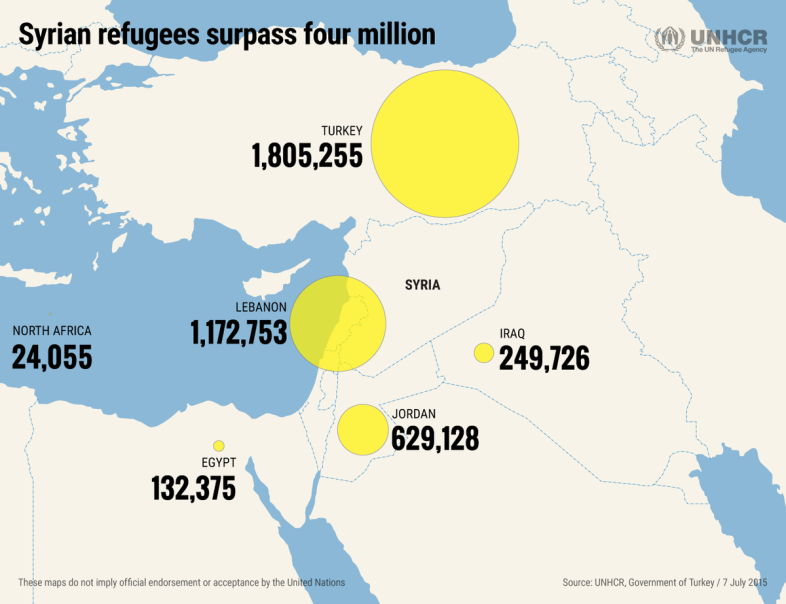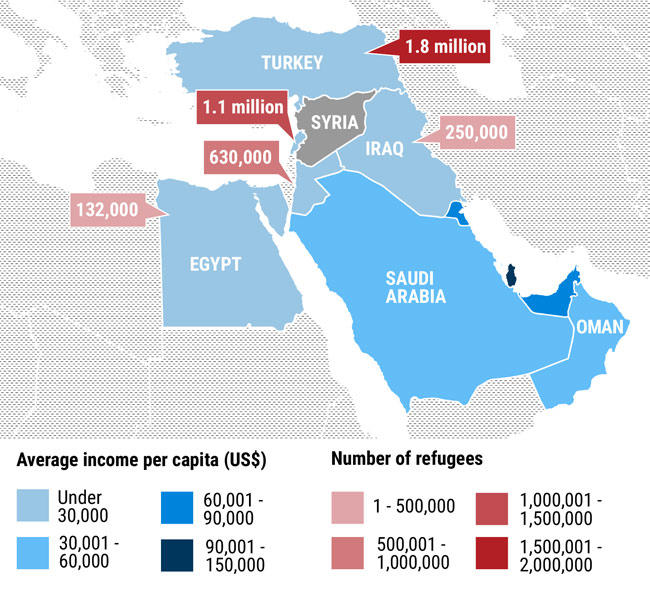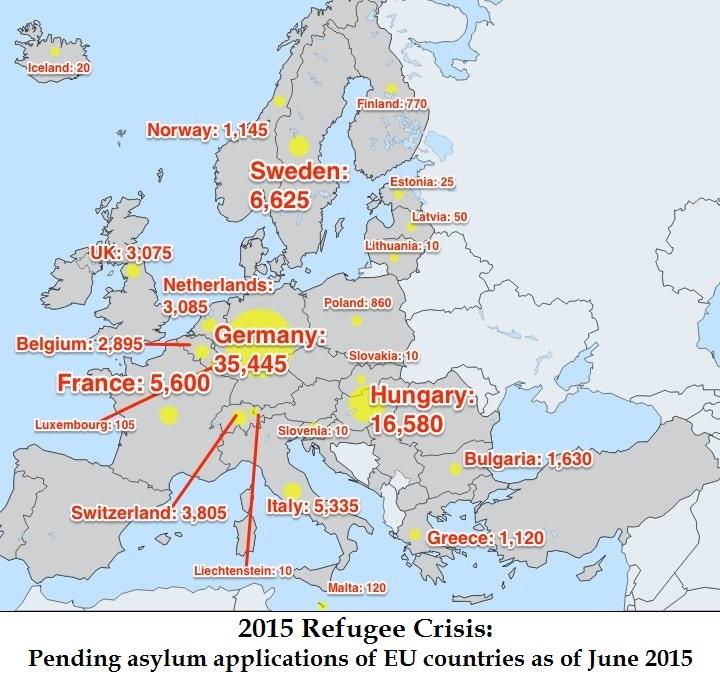Executive summary
Nowadays the world faces a great political and humanitarian crisis. The fact is that constant skirmishes between local governments, terrorist organizations and rebels, peculiar to the Middle Eastern region, transformed into the real war. Syria became the place where the war came into its most complicated phase. Various terrorist organizations, stimulated by some western governments to create another force that could be controlled and used to change the political situation, united in the great organization known nowadays as ISIS. Having become a great power in the region, it managed to occupy large Syrian territories. People, residing in these regions, were the first to suffer from the new merciless regime and they decided to leave their homes, aiming to find the new place to live and save their families. All these conditions led to the appearance of the humanitarian crisis as millions of refugees tried to reach Europe and settle there. That is why, 4 million people left their homes (Specia, 2015).

Being not able to shelter all these people, states of the EU faced a great problem as there was no efficient policy or strategy that could help to change the situation. Moreover, a great number of states decided to close their borders in order to protect their own population from the bearers of another culture. Under these conditions, appeals of the leaders of various states and media to the GCC countries become more and more intensive and pretentious. Very often, newspapers like Time publish articles in which they outline the unwillingness of the countries of the GCC to shelter Syrian refugees and help to find the needed solution (Maslin, 2015).
Accusations

Thus, it should be said that the main sense of accusations connected with the unwillingness to shelter refugees lies in the following points. First of all, various means of media underline the fact that the majority of people, who want to settle in Europe, belong to Islam and it would be more natural and comfortable for them to stay in some Muslim countries of the region as the term of adaptation will be much shorter. Additionally, adherers of the idea that the GCC countries should participate in the crisis more, state the fact that the number of conflicts based on the religious and cultural reasons has increased significantly in last several months. Europeans are not ready to meet thousands of Muslims who could change their traditional world and culture.
That is why it is quite logical that other Muslim countries should shelter these refugees. Nevertheless, there is another fact provided by the adherers of this idea. The states like the UAE, Qatar or Saudi Arabia have great incomes obtained from the distribution and refining of crude oil. Moreover, their population density is not very high and these countries could shelter a great number of people. With this in mind, it is possible to state the fact, that various politicians and means of media underline the presence of all factors that are needed to create appropriate conditions for millions of refugees. Finally, the way will be not so long and complicated, which is also important, as the world was shocked by horrible accidents that happened during the trips of people who wanted to reach Europe. Under these conditions, it is possible to state the fact that from this perspective these accusations seem to be quite logic and fair enough.
Answer to accusations
However, it should be said that outlining beneficial conditions that exist in the countries of the Gulf, politicians and media prefer to look at the situation from the perspective which is adventitious for them. However, there is a great number of other facts that should not be omitted and which prove the fact that the GCC countries do not refuse to shelter refugees. According to the formal statement of Qatar, Saudi Arabia and the UAE, their borders are not closed for Syrian people who want to leave homes in order to find some peaceful region (Maslin, 2015). Moreover, about 2,5 million people are accepted by these countries, however, they are not called refugees and not placed in refugee camps in order to protect their dignity (Why aren’t rich Gulf states welcoming Syrian refugees… or are they? 2015). It is obvious, that this category is not mentioned by politicians while speaking about the unwillingness of the Gulf countries to help Syrians.
Additionally, the GCC countries stated that the procedure of border crossing was changed for people from Syria and it is much easier for them to reach their destination point (Why aren’t rich Gulf states welcoming Syrian refugees… or are they? 2015). Thus, despite all these measures, the official statistic states that there are no Syrian refugees on the territory of the GCC states (Maslin, 2015). The most important fact is that these people simply do not want to go to these countries, preferring some European regions. The reason for this choice lies in the beneficial legal basis that provides profitable status for refugees and guarantees them some allowance which is big enough for a person to survive without looking for a job. According to the last survey, Germany is the main aim of the majority of refugees (StMa, 2015). It is a prosperous state, with a stable economy and high allowance. All these factors make Germany very attractive to people.

That is why, the countries of the Gulf, which do not have the same profitable laws, are not chosen by refugees. Under these conditions, the answer to these accusations resides in the fact that it is not the policy of the GCC countries that prevents people from coming to these states and creating settling there. However, Syrian refugees prefer to make a very dangerous voyage in order to obtain at least a vague possibility of reaching Germany or another prosperous European state. Finally, another important fact should be mentioned as the answer to unfair accusations.
Taking into account the already mentioned fact that the countries of the GCC do not accept the legal concept of refugees in order not to humiliate the dignity of a person, they suggest them the legal status that allows freedom of movement, the right for free healthcare and the right to work (Why aren’t rich Gulf states welcoming Syrian refugees… or are they? 2015). Additionally, Syrian workers, residing in the states of the GCC are suggested to replace their families to these very countries. With this in mind, it becomes obvious, that there are no barriers created by the countries of the GCC in order to prevent refugees from coming to these regions, however, people refuse to go there hoping to find some better conditions.
UAE participation
Nevertheless, it should also be said that among the countries of the Gulf, the UAE could be taken as the one which shows the greatest interest in the given issue and tries to take various steps to help people. First of all, it provided about $1,1 billion in order to support Syrians who suffered from the aftermath of the war with ISIS on the territory of Syria (Why aren’t rich Gulf states welcoming Syrian refugees… or are they? 2015). However, realizing the fact that this money is not enough to change the existing situation, the UAE also made some other steps.
Thus, about 17 thousands of Syrian students are now studying at local schools in the UAE (). Moreover, a great number of various projects whose main aim is to help refugees were created by the state. Due to the Al Mreijeb Fhoud Refugee Camp in Jordan about 10000 refugees obtained shelter (Why aren’t rich Gulf states welcoming Syrian refugees… or are they? 2015). Finally, several hospitals in Jordan were also founded by the UAE in order to provide medical services for Syrian people (Why aren’t rich Gulf states welcoming Syrian refugees… or are they? 2015). With this in mind, it is possible to state the fact that the UAE nowadays shows great interest in the situation connected with refugees and tries to help people in various ways.
Recommendations
Resting on the above-mentioned facts, it is possible to make a certain conclusion. Thus, is it possible to say that all accusations of various politicians connected with the countries of the GCC and their role in the Syrian crisis are groundless, as these countries do a lot to help people? However, they prefer European countries because of some vague advantages. Under these conditions, it is possible to suggest some campaign that will explain the benefits of the countries of the GCC for refugees and change their route. It is obvious, that various means of media should be used to show people that Europe is not able to shelter everyone and some Muslim countries could be chosen. This PR campaign supported by various media could help to improve the current situation.
References
Gulf states refuse to open doors to Syrian Muslim refugees. (2015). Web.
Maslin, J. (2015). Why Some Arabs States Refuse to Accept Syrian Refugees. Time. Web.
Specia, M. (2015). Syria’s refugee population reaches more than 4 million. Mashable. Web.
StMa. (2015). Obama to let in another 10,000 Syrian refugees despite no way of identifying terrorists. D.C. Clothesline. Web.
Why aren’t rich Gulf states welcoming Syrian refugees… or are they?(2015). Web.